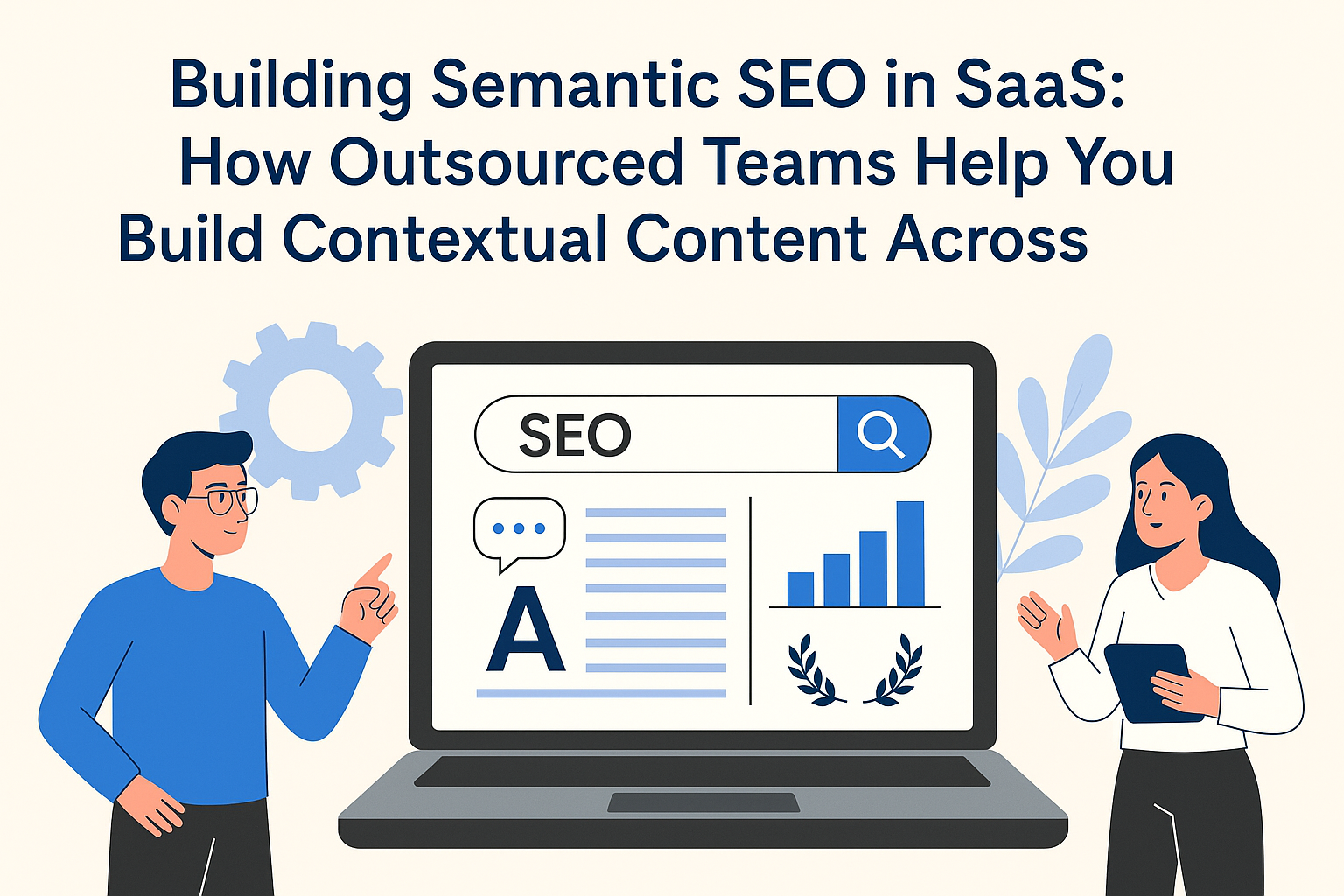Building semantic SEO in SaaS: how outsourced teams help you build contextual content across products

In today’s competitive SaaS landscape, ranking on search engines is no longer about stuffing keywords or publishing generic blogs. Success comes from delivering content that aligns with user intent, speaks the language of your industry, and builds topical authority. This is the essence of semantic SEO and it’s the future of discoverability for SaaS platforms with multiple products or modules.
I’ve seen how outsourced SEO teams, especially those with experience supporting SaaS brands can accelerate semantic SEO implementation by weaving context-rich content across a diverse suite of offerings. Here’s how they do it.
Why semantic SEO matters in SaaS
SaaS companies often cater to diverse use cases, industries, and personas. Traditional SEO may rank individual pages, but semantic SEO aims to rank topics. It goes deeper:
-
Understanding intent clusters instead of single keywords
-
Building topic hubs and supporting content (pillar-cluster models)
-
Creating internal links that guide both users and search engines
-
Ensuring content reflects real-world relationships between features, benefits, and business needs
This becomes especially important when your SaaS platform offers a range of solutions (e.g., CRM, helpdesk, automation, analytics), each with its own value proposition.
The challenge of semantic scale: why outsourcing helps
Semantic SEO at scale demands expertise in:
-
Keyword and entity mapping
-
Intent-driven content planning
-
Consistent, high-volume content creation
-
Structured internal linking and schema markup
SEO outsourcing companies bring the method and capacity to execute across these areas. They collaborate closely with in-house stakeholders to ensure messaging and domain authority stay consistent, while managing the execution of:
-
Cross-product keyword research
-
Contextual blog series and knowledge base expansion
-
Linking content back to product and solution pages
-
Semantic markup and structured data integrations
An experienced partner like Briskon, a SaaS SEO agency, can offer strategic insight and scalable execution for SaaS companies looking to build contextual relevance across their product suite.
Building topical authority across your SaaS ecosystem
A strong semantic SEO foundation positions your brand as an authority in related topics, not just individual keywords. This builds trust with both users and search engines.
Let’s say your SaaS company offers both project management and team collaboration tools. An external content partner could:
-
Map overlapping and unique entities between those categories
-
Create topic clusters such as "remote work efficiency," "agile workflows," or "digital collaboration"
-
Optimize product pages with supporting FAQs, glossaries, and thought leadership pieces
-
Publish contextual use cases that interlink multiple modules organically
The result? A web of semantically relevant content that boosts visibility and user engagement across the funnel.
Scaling semantic coverage without straining internal teams
Your internal content and product marketing teams likely have a full plate. From campaign planning to customer education, they may not have the bandwidth to create 30–50 contextual articles per quarter.
This is where outsourcing adds value without diluting quality:
-
Velocity: a dedicated content partner delivers at scale.
-
Expertise: teams understand SaaS taxonomies, customer journeys, and the nuances of B2B buyer intent.
-
Continuity: they maintain consistent tone, interlinking, and structural depth across content pillars.
-
Adaptability: whether you’re launching a new product or expanding to a new vertical, they can pivot fast.
Companies like Briskon specialize in delivering scalable SEO strategies tailored to the demands of SaaS platforms, supporting both growth and consistency.
Beyond blogs: extending semantic SEO to support and documentation
Semantic SEO isn’t limited to blogs or landing pages. Outsourced teams can enrich other content assets:
-
Knowledge base articles that address long-tail queries and link to feature pages
-
Support documentation that includes structured FAQs with schema for Google snippets
-
Product release notes that connect to how-tos and use cases
All of this builds semantic relevance and boosts non-branded search visibility while improving user experience.
Measuring impact: how semantic SEO drives results
Semantic SEO improves multiple performance metrics:
-
Higher rankings for long-tail and informational queries
-
Lower bounce rates and longer session duration
-
More qualified traffic across TOFU, MOFU, and BOFU
-
Greater discoverability of cross-sell or complementary modules
-
Enhanced authority and topical coverage in search engines’ eyes
Outsourced teams that focus on SaaS growth can help track and optimize these outcomes using:
-
Topic-level content performance dashboards
-
Entity coverage and link map analysis
-
CTR and dwell time benchmarks by content type
Final thoughts: build smarter, not just harder
In a product-rich SaaS ecosystem, semantic SEO is no longer a nice-to-have, it’s a strategic lever for growth. By partnering with experienced SEO services providers, SaaS companies can:
-
Build deep, contextual coverage across their solution set
-
Align content to user needs and search intent
-
Free internal teams to focus on brand and strategic narratives
The bottom line? Outsourced semantic SEO doesn’t just improve rankings. It builds understanding. And in the age of intent-driven search, that’s your biggest competitive edge.
- Questions and Answers
- Opinion
- Motivational and Inspiring Story
- Technology
- Live and Let live
- Focus
- Geopolitics
- Military-Arms/Equipment
- Security
- Economy
- Beasts of Nations
- Machine Tools-The “Mother Industry”
- Art
- Causes
- Crafts
- Dance
- Drinks
- Film/Movie
- Fitness
- Food
- Games
- Gardening
- Health
- Home
- Literature
- Music
- Networking
- Other
- Party
- Religion
- Shopping
- Sports
- Theater
- Health and Wellness
- News
- Culture

